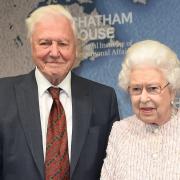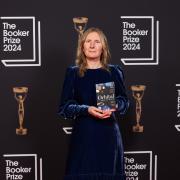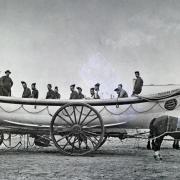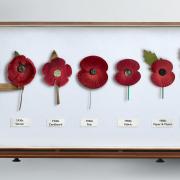Anita Rani was acutely aware of others trying to put her “in a box” when she began her TV career.
“Nobody really saw me for me, people just saw ‘brown woman’,” says the 45-year-old. “I’ve always been aware that I have to work really hard to change people’s perceptions.
“I want them to see me for me, but I also want them to see that Asian women can be something more than just smart and trustworthy and clever and square.”
Now a presenter and broadcaster for BBC’s Countryfile, The One Show and BBC Radio Four’s Women’s Hour, Rani’s first foot in the industry was Top of The Pops.
Born in Bradford to Indian parents, the presenter says: “I remember specifically being very aware that people wanted to put me in a box. You know, the jobs you get offered and the work people thought that you wanted to do, being told that my placement should be at the Asian programmes unit – I got my placement at the BBC music department.”
Her debut novel, Baby Does a Runner, although fiction, nods to some of her experiences as a British-Asian woman growing up in the north of England. Her protagonist, named Baby, is 36, single, overworked and underappreciated.
“I think most people who have some kind of other background, whether it’s working class or a person of colour, and don’t fit the landscape of your work environment, will recognise that maybe you have to jump up and down a little bit more than the person next to you,” says Rani.
“I also know that if you’ve worked hard enough to get into a place where no one looks like you, you’ve really kicked the door in to get there. You’re not scared of hard work, and that kind of gives you the edge.”
Following on from her memoir, The Right Sort of Girl, published in 2021, Rani continues to explore issues of patriarchy and culture – but her fiction writing has a lightness and humour too.
“It’s not easy when you’re first-generation born in this country moving between different worlds. And lots of it isn’t very funny, but I think you have to find space to laugh.”
She’s never been scared to lift the lid and question elements of her own culture. “I have to write truthfully about the experience. And if I am scared to talk about it, they’ve done their job, haven’t they? They’ve put me in a box and they’ve made me fear.”
Perceived shame surrounding being single in your 30s, or even 20s, isn’t just a South Asian thing though, she notes: “It’s a woman thing, isn’t it?” The message that success equals marriage and children is pretty ingrained. “We are equated to those two things. It’s everywhere, it’s all around us.”
Thankfully, she says, questions about whether or not she wants children herself have stopped now.
“How many of us are making choices based on what we actually want to do?” Rani asks, “and how many of us are doing it because it’s what’s expected of us? And those are the things that I’m personally grappling with.”
Rani met her own husband, tech company exec Bhupinder Rehal, at the age of 30, but felt pressure to settle down her whole life. “It’s just drip fed to you. As women, we’re all told it. ‘Have you met anyone yet? We just don’t want you to be lonely’. I think it really ramped up from about [age] 25, but when you hit 30 it’s like, bloody hell, what’s going on?”
Amid the pressure from extended family to settle down, the novel sees Baby do the opposite. A discovery of letters uncovering a secret that her beloved grandfather had a wife and family before her grandmother, leads to her taking a soul-searching, truth-seeking trip to Punjab, India.

Rani herself explored her history when she appeared on BBC’s Who Do You Think You Are? back in 2018, in which she discovered what had happened to her grandfather’s first family during the Partition.
And although her own opportunities are a million miles away from previous generations’ (Rani’s parents had an arranged marriage, after meeting for the first time at Heathrow Airport) in the past she’s “definitely” been a people pleaser. It resulted in “second guessing what people wanted, always wanting to make sure that other people feel alright… and that comes from watching the women in my world facilitate everybody else before themselves”.
But her forties have been “very transitional”, she says. “[I feel] very empowered, and comfortable, confident, definitely. Don’t give a f*** as much.
“I think at some point, you wake up and realise it’s time to make myself happy, because I think women do look after everybody, whether that’s because that’s what society expects, or whether it’s your parents or your husband or your children.
“You realise that it’s a bit of a waste of time trying to please other people. And once you find who you are, and you walk into a room authentically, valuing who you are – that’s a sensational feeling.
“I’m talking a big game,” she laughs, “Yeah, let’s say all the things, then I’ll have a crisis.” Rani is refreshingly down to earth.
She hopes there’s more books to come. Her process is to write in the morning: “I do like getting up a little bit earlier, 5am, it’s bloody early, I’m a morning person, I quite like the quietness. I like being awake when no one else is and you can get it down.”
Rani swears by plain hot water first thing. “Every day – it’s become a ritual. Just a hot water, then a cup of tea, Yorkshire Tea, but because I’ve moved to London and I’m a bit fancy now, sometimes Fortnum & Mason’s loose leaf tea,” she says, with a warm laugh. “Yeah, Bradford? What Bradford?”
Baby Does a Runner by Anita Rani (Zaffre, £14.99) is available July 20.


























